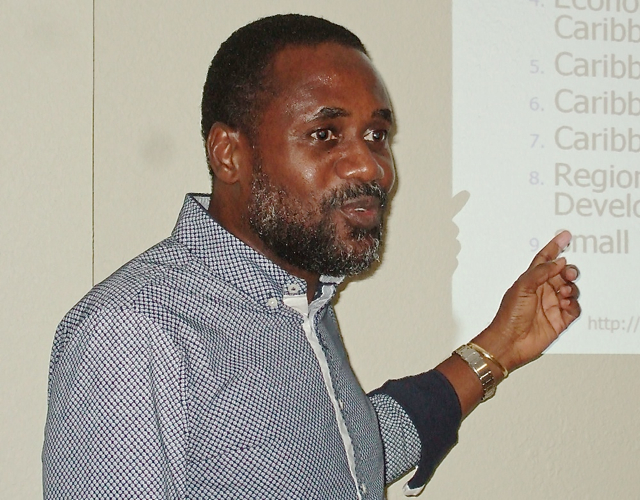
Gardner spoke Saturday on St. Croix at a public briefing on regional negotiations for the Third International Conference on Small Island Developing States. The meeting was held at the Arawak Bay Inn at Salt River.
The Foundation researched the relationships of neighboring islands and their economic development, and reported on climate change and water resource development.
Gardner presented results of the recent “U.S. Virgin Islands in Context of the Development Agenda for Small Islands Developing States” study to a small but engaged audience after presenting the information on St. Thomas earlier this month.
Gardner opened his presentation with a question: “Why should we be interested in the rest of the Caribbean, since we are aligned with the United States?”
Because the territory shares history, culture, ocean resources with other Caribbean islands, the territory should work together and trade with them, he answered. Common challenges among islands include the scarcity of natural resource, land size limits, transportation as well as health care and insurance for residents. It seems natural for islands to band together for a common good, Gardner said.
Participation in Caribbean organizations would increase resources by sharing business, trade, food, music and environmental programs, Gardner said. Without membership in the organizations, the territory cannot share natural resources, shipping or stimulate the islands’ economies.
The territory belongs to the Organization of Eastern Caribbean States, the Caribbean Council for Science and Technology, the Caribbean Tourism Organization and has memorandums of understanding with the British Virgin Islands and Puerto Rico. It is an associate member of the Economic Commission for Latin America and the Caribbean.
The Virgn Islands is not involved in some of the regional associations because it is a U.S. possession. The U.S. belongs to the some of these organizations and since the territory is part of the U.S., its relationship with neighboring islands is through the federal government. Priorities for the U.S. Virgin Islands may not be priorities of the United States.
“It (membership) would allow us to do certain things independent of the United States,” Gardner said.
Currently, the territory does not interact officially with the Caribbean Development and Cooperation Committee or the Small Island Developing States Programme of Action.
By changing the U.S. government mindset about the Virgin Islands, the territory is likely to develop a more robust economy, Gardner said. LaVern Ragster, former president of the University of the Virgin Islands, added instead of “people coming to beg.”
“We should optimize our position in the region and continue to be an asset to the U.S. and to work and develop ourselves,” Ragster said. “That starts at the top,” of the government she said.
Paul Chakroff, an environmental consultant, said changing the “mindset” was important, as was understanding the regional and global relationships of the U.S. Virgin Islands. The neighboring small island nations can positively affect each others’ economic development, he said.
Delegate to Congress Donna Christensen, who attended the presentation, said she plans to continue a dialogue with the U.S. State Department about the territory’s need to negotiate with its Caribbean neighbors. So far she has garnered “no support,” she said. Christensen said that since the administration of President Clinton, she has been trying to portray the territory as a center for trade, energy and education.
“We have to be in the process of planning for sustainability and growth and I don’t think we are right now,” Christensen said.
Gardner gave examples of ways the islands could create income and jobs; becoming a testing ground for items made for our climate, such as home building products and clothing, a data transfer center and in trade between the islands.
“Sustained focus,” is the most important thing, he said.
Claudette Young Hinds, a frequent participant in the audience, suggested the U.S. Virgin Islands model an agriculture program after Israel, which created a farming community in the desert. Young-Hinds is the president of St. Croix Unified for Community, Culture, Environment and Economic Development Inc.
SIDS was started in 1992 and includes members from about 40 island countries in the Pacific, the Caribbean and other locations. Since its beginning, there have been three international conferences.
The next United Nations sponsored meeting is in Samoa in 2014. An outcomes document based in part on issues discussed by the regional members this fall in Barbados, will be presented to the United Nations. Some of the subjects covered are sustainable development goals and actions to deal with climate change, chemical waste, health, food, the oceans, biodiversity, energy and disaster risk reduction. There also will be discussions on financing, technology transfer and data collection.
Since the U.S. Virgin Islands is not a member, the United States will not be bound by any agreement that would affect the islands, at any SIDS conference.
The Foundation for Development Planning was founded by three members in 2010 and now has board members from around the Caribbean.





